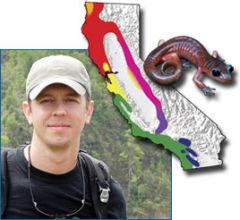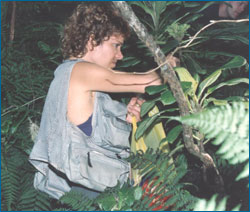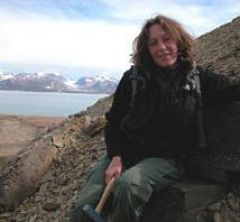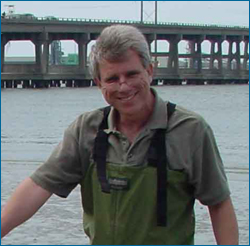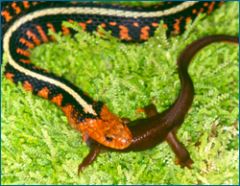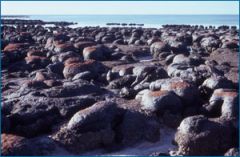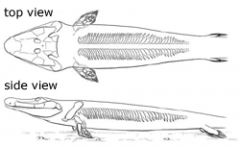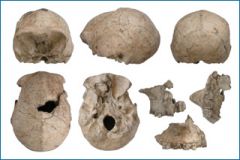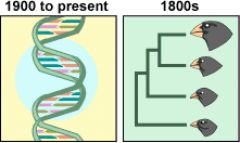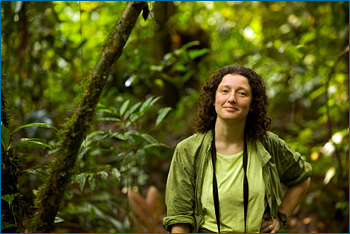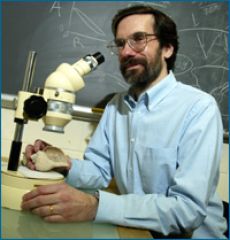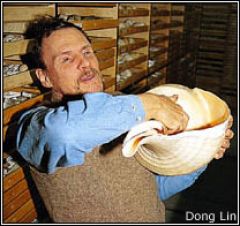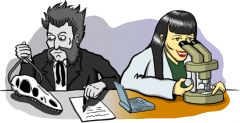Found 17 resources for the concept:
The real process of science is complex, iterative, and can take many different paths.
A closer look at a classic ring species: The work of Tom Devitt
Grade Level(s):
- 9-12
- 13-16
- General
Source:
- UC Museum of Paleontology
Resource type:
- Research profile
Time: 40 minutes
Overview
The Ensatina salamander has been extensively investigated because it is a ring species — a species that demonstrates how geography and the gradual accumulation of genetic differences factor into the process of speciation. Biologist Tom Devitt continues the more than 50 years of Ensatina research by applying new genetic techniques and asking new questions about this classic evolutionary example.
Aloha, spider style! The work of Rosemary Gillespie
Grade Level(s):
- 9-12
- 13-16
- General
Source:
- UC Museum of Paleontology
Resource type:
- Research profile
Time: one class period
Overview
This research profile follows Dr. Rosemary Gillespie to Hawaii as she evaluates hypotheses about the evolution of the colorful happy-face spider.
Ancient fossils and modern climate change: The work of Jennifer McElwain
Grade Level(s):
- 9-12
- 13-16
- General
Source:
- UC Museum of Paleontology
Resource type:
- Research profile
Time: 40 minutes
Overview
Wondering how global warming will affect our planet? Scientist Jennifer McElwain studies the fossil record in order to learn more about how global warming has affected life on Earth in the past and how it might affect life on Earth in the future.
Angling for evolutionary answers: The work of David O. Conover
Grade Level(s):
- 9-12
- 13-16
- General
Source:
- UC Museum of Paleontology
Resource type:
- Research profile
Time: 30 minutes
Overview
Human activity has certainly affected our physical environment - but it is also changing the course of evolution. This research profile follows scientist David O. Conover as he investigates the impact of our fishing practices on fish evolution and discovers what happened to the big ones that got away.
Battling bacterial evolution: The work of Carl Bergstrom
Grade Level(s):
- 9-12
- 13-16
- General
Source:
- UC Museum of Paleontology
Resource type:
- Research profile
Time: 30-40 minutes
Overview
This research profile examines how the scientist Carl Bergstrom uses computer modeling to understand and control the evolution of antibiotic resistant bacteria in hospitals.
Biological warfare and the coevolutionary arms race
Grade Level(s):
- 9-12
- 13-16
- Advanced
- General
Source:
- UC Museum of Paleontology
Resource type:
- Article
Time: 45 minutes
Overview
The rough-skinned newt looks harmless enough but is, in fact, packed full of one of the most potent neurotoxins known to man. Find out how an evolutionary arms race has pushed these mild-mannered critters to the extremes of toxicity and how evolutionary biologists have unraveled their fascinating story.
Darwin’s Great Voyage of Discovery
Grade Level(s):
- 9-12
Source:
- WGBH
Resource type:
- Article
Time: One to two class periods
Overview
Students learn about Darwin's voyage on the Beagle by reading excerpts from his letters and journals and mapping his route.
Del caldo primigenio a las células: El origen de la vida
Grade Level(s):
- 9-12
- Advanced
- General
Source:
- UC Museum of Paleontology
Resource type:
- Tutorial
Time: 20 minutes
Overview
Profundiza en los conocimientos actuales sobre el origen de la vida y en cómo los científicos y las científicas son capaces de investigar en los detalles de acontecimientos tan antiguos.
Evo in the news: What has the head of a crocodile and the gills of a fish?
Grade Level(s):
- 9-12
- 13-16
- General
Source:
- UC Museum of Paleontology
Resource type:
- Evo in the News article
Time: 15 minutes
Overview
This news brief, from May 2006, reviews what is likely to be the most important fossil find of the year: Tiktaalik helps us understand how our own ancestors crawled out of the water and began to walk on dry land.
Evo in the news: When it comes to evolution, headlines often get it wrong
Grade Level(s):
- 9-12
- 13-16
- General
Source:
- UC Museum of Paleontology
Resource type:
- Evo in the News article
Time: 15 minutes
Overview
Newly discovered fossils are prompting some scientists to consider a minor revision of the relationships shown on the human family tree. This news brief from September 2007 clarifies the occasionally misleading news coverage of the story.
From soup to cells – The origin of life
Grade Level(s):
- 9-12
- Advanced
- General
Source:
- UC Museum of Paleontology
Resource type:
- Tutorial
Time: 20 minutes
Overview
Delve into our current understandings of the origins of life and how scientists are able to investigate the details of such ancient events.
This article is located within Evolution 101.
Great Fossil Find
Grade Level(s):
- 6-8
- 9-12
- 13-16
Source:
- ENSI
Resource type:
- Classroom activity
Time: 40 minutes
Overview
Students are taken on an imaginary fossil hunt and hypothesize as to the identity of the creature they discover. Students revise their hypotheses as new evidence is "found."
History of evolutionary thought
Grade Level(s):
- 9-12
- General
Source:
- UC Museum of Paleontology
Resource type:
- Article
Time: Varies
Overview
In this section, you will see how study in four disciplinary areas — Earth's history, life's history, mechanisms of evolution, and development and genetics — has contributed to our current understanding of evolution.
How boogieing birds evolved: The work of Kim Bostwick
Grade Level(s):
- 9-12
- 13-16
- General
Source:
- UC Museum of Paleontology
Resource type:
- Research profile
Time: 30 minutes
Overview
This research profile follows ornithologist Kim Bostwick through the jungles of Ecuador and the halls of museums as she investigates the evolution of an exotic bird's complex mating dance.
How to survive a mass extinction: The work of David Jablonski
Grade Level(s):
- 9-12
- 13-16
- General
Source:
- UC Museum of Paleontology
Resource type:
- Research profile
Time: 40 minutes
Overview
Through detailed analysis of patterns in the fossil record, scientist David Jablonski reconstructs the rules that helped dictate who lived and died in past mass extinctions. This research profile describes his surprising discoveries and their disturbing implications for the biodiversity crisis today.
Interview: Geerat Vermeij on the Fossil record
Grade Level(s):
- 9-12
- Advanced
- General
Source:
- California Academy of Sciences
Resource type:
- Interview with Scientist
Time: 20-30 minutes
Overview
This interview with MacArthur Fellow and paleobiologist, Geerat Vermeij, covers much ground, including adaptations in the mollusks he studies, evolutionary arms races, punctuated equilibrium, extinctions, macroevolution, and the value of diversity.
Nature of science
Grade Level(s):
- 6-8
- 9-12
- General
Source:
- UC Museum of Paleontology
Resource type:
- Tutorial
Time: 20-30 minutes
Overview
Understanding how science works allows one to easily distinguish science from non-science. Thus, to understand biological evolution, or any other science, it is essential to begin with the nature of science.

